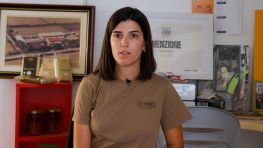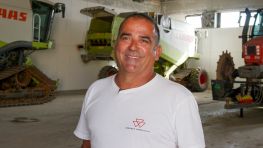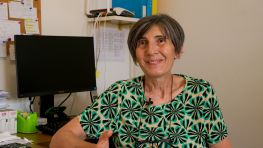 Rosalia Vacca and the Dream of…
Rosalia Vacca and the Dream of… Domenico Costanzo
The rice with a human soul.
Domenico Costanzo, born in 1955, originally from the flat area of Monferrato. Born in a farmhouse without electricity, without telephone, water and services in the house, he carries within himself the traces of those who preceded him, their fatigue. Graduated in agriculture, he took over the company of his ancestors, with an uncommon passion, a "congenital disease" that has always grown in him, since he was a child, following the example of his parents.
Today the work of him and that of his children, thanks to the equipment and technologies applied to agriculture, is less and less physically tiring but requires the ability to constantly update and a broad knowledge base. For years Domenico has collected in a large space adjacent to his home the material testimonies of the heroic and hard agriculture that was practiced before the Green Revolution, based on manual work and the ability to invent, build, adapt and re-adapt tools.
Mondine, transplanting and other traditional crafts, supplanted by agricultural machinery, are told by Costanzo with great clarity and supported by vivid details. The value of work, at the service of the community, is at the center of his action, both in the role of agricultural entrepreneur and when, in the role of trainer and witness, he is invited to the schools of his territory.
Video table of contents
- Presentation.
- The passion for work that passes through the past.
- Returning to the countryside after the years of study was not easy but I have never regretted it.
- The physical fatigue we do today is incomparably less than what our parents did but much more training is needed.
- Dry cultivation and the role of water in rice fields: the thermal flywheel.
- The fatigue of working in the fields: mondine and transplanting.
- Today young people are not empowered, they are not given the opportunity to give them experience.
- The generational clash is necessary to grow.
- Everyone talks badly about chemistry but no one remembers the benefits it brought. It is not dangerous by definition.
- Each generation must leave something to those who will follow: a metaphor.
- The historical varieties are marginal and are the result of the study but also of the knowledge that was contained in the historical ones.
- Direct sales and the "fashion" of colored rice.
- The microtoxins of corn: the example of throat cancer in the Bergamo area.
- We farmers are penalized by a market that makes the price for us.
- Each field is different.
- The size of the paddy rooms has grown with mechanization and technology.
- The "wave" effect in the large rooms.
- Cows: the "necessary evil" of old farms.
- The landscape was once less uniform.
- Flooding of rice fields during the second war of independence.
- The rotations of yesterday and today.
- The old farmers had an empirical knowledge that were handed down and which is still precious today.
- Do not start the harvest on Monday ... but also the other jobs.
- The Cavagnin.
- Rice feeds the world: it is the noblest.
- The starch structure of rice varieties and food styles.
- The panissa from Vercelli had been set aside a bit.
- Risotto with Sunday hen broth.
- Mum was denied pasta with pasta but made risotto with anything.
- The rice flower.
- Clearfield rice, crodo rice, rice over rice.
- The polluted water that reaches our ditches.
- The flowering of rice.
- Transplants and teamwork.
- The difference between mondine and transplants.
- Tools speak of effort and express wisdom.
- Food is not just calories but it is value. Respect food to respect life.
Interview information
Country: IT
Region: Piemonte
City: Villanova Monferrato
Domenico Costanzo
Year: 1955
City: Villanova Monferrato
School: University
Profession: Farmer
Languages: Italiano / Piemontese
Document by: Luca Ghiardo
Video by: Luca Ghiardo
Created: 28-04-2021
Questo video fa parte del seguente archivio
Rice stories
Rice stories
Food is a fundamental resource for man and his health, both through the supply of nutrients and the ability to embody traits of human culture that play a leading role in our well-being.
Over time, each territory has built original ways in which to relate to the fruits of its land, enriching them with rituals, symbolic meanings and culinary customs. Much of these relationships have been lost following the years of the economic boom, with the exodus from the countryside to urban centers, with the advent of agriculture for mass production and ultimately with the globalization of markets and the consequent impoverishment of the heritage of biodiversity and ethnodiversity.
The purpose of this archive is to collect evidence relating to the main rice production area in Europe, that is the Po Valley, and to investigate, through the analysis of textual sources and testimonies collected in the field, both what survives of this heritage, and the ways in which which has evolved and reached us, paying particular attention to the explicit and implicit links that bind food and health.






